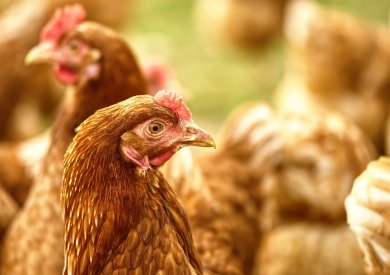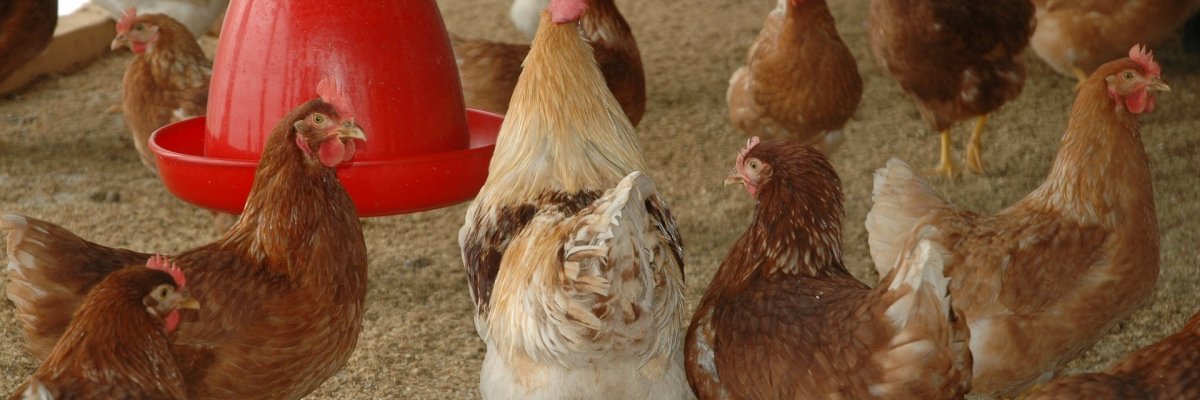Avian flu
Avian flu
Avian influenza is an infection with influenza viruses that can affect all poultry species. Healthy animals can become infected through contact with sick animals or their excretions. Furthermore, transmission can also occur through contaminated utensils. The virus has been increasingly detected in wild birds. These can carry the pathogen over long distances. The risk of infection between wild and farmed birds is increased, especially in the vicinity of waterfowl resting and gathering areas.

Bird flu outbreak in Waldeck-Frankenberg
After there was an outbreak of bird flu on two farms in the county in December 2022, the county issued a general order with further protective measures to protect the bird and poultry population.
Recommended safety measures for keepers throughout the county
In coordination with the Hessian Ministry for the Environment, Climate Protection, Agriculture and Consumer Protection and the Kassel Regional Council, the district recommends increased biosecurity measures for resident poultry farmers:
- Only aviaries with a closed solid roof and bird-proof nets or grids on the sides may be used for housing poultry or for outdoor exercise.
- Cleaning and disinfection of shoes before entering and after leaving the poultry area or the use of disposable shoe covers.
- Storage of feed and litter inaccessible to wild birds
- Feeding poultry only in places inaccessible to wild birds
- Only use water for the drinking trough to which wild birds do not have access.
Frequently asked questions
What is avian flu?
Avian influenza is an infection with influenza viruses that can affect all poultry species. A distinction is made between virus types of different aggressiveness. The H5N1 virus type currently circulating in Germany is a very easily transmissible variant that causes severe courses of disease and is therefore also referred to as avian influenza.
How is the virus transmitted?
Healthy animals can become infected through contact with sick animals or their excretions. Sick animals excrete the pathogen with their faeces and with mucus or fluids from their beaks and eyes. In case of direct contact, other animals become infected by inhaling or picking up virus-containing material. Furthermore, transmission can also occur through contaminated commodities such as vehicles, equipment or packaging material. The virus has been increasingly detected in wild birds. These can carry the pathogen over long distances. The risk of infection between wild and farmed birds is increased, especially if they are kept near waterfowl resting and gathering areas.
Is bird flu contagious for humans?
Human infections with the H5N1 pathogen in Germany are not known so far, according to the Robert Koch Institute. Transmission of the virus through food is unlikely.
How can poultry keepers protect themselves preventively?
Poultry keepers should not allow their birds to come into contact with natural water bodies and should only feed them in places that are inaccessible to wild birds. Feed, litter and other items with which poultry may come into contact should be kept out of reach of wild birds. Hunters who have been in contact with feathered game should avoid domestic poultry. Similarly, direct contact of persons and domestic animals with dead or diseased wild birds should be avoided. Finding dead or sick animals - especially waterfowl and birds of prey - must be reported to the veterinary office at Tel. 06451 - 743 753.
What precautions are taken to prevent spread?
In coordination with the Hessian Ministry for the Environment, Climate Protection, Agriculture and Consumer Protection and the Kassel Regional Council, the district recommends increased biosecurity measures for resident poultry farmers:
- Cleaning and disinfection of shoes before entering and after leaving the poultry area or the use of disposable shoe covers.
- Storage of feed and litter inaccessible to wild birds
- Feeding poultry only in places inaccessible to wild birds
- Only use water for the drinking trough to which wild birds do not have access.
What should be done if a dead animal is found with suspected avian influenza?
If a sick or dead wild bird, especially water fowl (swans, ducks, geese) but also birds of prey, is found, the veterinary office of the Waldeck-Frankenberg district should be informed by calling 06451 - 743 753. The animal will then be taken to the State Laboratory of Hesse in Gießen for further examination. Dead songbirds or pigeons should only be reported if several dead birds of these species are found in one place.
